

It’s All Your Fault: High Conflict People
TruStory FM
Hosted by Bill Eddy, LCSW, Esq. and Megan Hunter, MBA, It’s All Your Fault! High Conflict People explores the five types of people who can ruin your life—people with high conflict personalities and how they weave themselves into our lives in romance, at work, next door, at school, places of worship, and just about everywhere, causing chaos, exhaustion, and dread for everyone else.
They are the most difficult of difficult people — some would say they’re toxic. Without them, tv shows, movies, and the news would be boring, but who wants to live that way in your own life!
Have you ever wanted to know what drives them to act this way?
In the It’s All Your Fault podcast, we’ll take you behind the scenes to understand what’s happening in the brain and illuminates why we pick HCPs as life partners, why we hire them, and how we can handle interactions and relationships with them. We break down everything you ever wanted to know about people with the 5 high conflict personality types: narcissistic, borderline, histrionic, antisocial/sociopath, and paranoid.
And we’ll give you tips on how to spot them and how to deal with them.
They are the most difficult of difficult people — some would say they’re toxic. Without them, tv shows, movies, and the news would be boring, but who wants to live that way in your own life!
Have you ever wanted to know what drives them to act this way?
In the It’s All Your Fault podcast, we’ll take you behind the scenes to understand what’s happening in the brain and illuminates why we pick HCPs as life partners, why we hire them, and how we can handle interactions and relationships with them. We break down everything you ever wanted to know about people with the 5 high conflict personality types: narcissistic, borderline, histrionic, antisocial/sociopath, and paranoid.
And we’ll give you tips on how to spot them and how to deal with them.
Episodes
Mentioned books
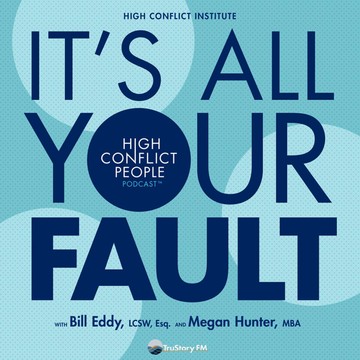
8 snips
Dec 29, 2022 • 34min
Times of High Risk: The Most Dangerous Times with HCPs
This installment delves into the unpredictable nature of high conflict personalities and their deep-seated fears. Discover how significant life changes—like divorce or job loss—can spark explosive reactions. The hosts share alarming real-life examples, including a tragic hotel shooting and condo board confrontations. They emphasize the importance of planning and careful timing when breaking bad news. With practical tips on managing workplace tensions and predicting potential escalations, this discussion is a must-listen for navigating high-risk situations.
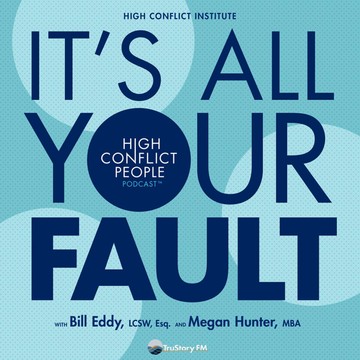
Dec 22, 2022 • 22min
Dilemmas & Decisions: Why It’s So Hard to Stop Yourself from Over-reacting in High-Conflict Situations
High-conflict situations can trigger our emotional overreactions, often rooted in the brain's wiring. The discussion dives into why we get hooked by these conflicts and the neurological challenges that arise. A 'Dilemmas and Decisions' list is introduced as a proactive tool to manage reactions and promote thoughtful analysis. Writing is highlighted as a transformative method for emotional regulation. Listeners are encouraged to engage with practical strategies that shift them from being reactive to proactive in challenging interactions.
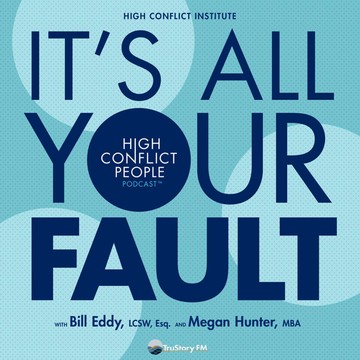
Dec 15, 2022 • 36min
How Brainwashing Works on a Child’s Brain
Did you know if brainwashing of a child is real in divorce and/or co-parenting? In parental alienation (child alienation), families are divided but is brainwashing behind it? A part of it? Or not at all?In today’s episode, Megan interviews Bill about his latest findings on this topic, which is one of the most challenging and painful life experiences that families go through. They will discuss:quick explanation of what parental alienation is why use the strong term of brainwashingthe role of neurons in a child’s brainwhy parental alienation seems to take hold primarily between the ages of 9 and 14, or does it?why alienated children have such strange or frivolous reasons why they resist or refuse contact with one of their parentswhy the child’s rejection or hatred of one parent is so pure and extreme, and not at all ambivalentan example of a 15-year-old girl who wrote a letter to her divorced father intending to end all contact with himwhat happened in that casewhat can be learned from itwhat should have happenedLinks & Other NotesWEBINAR: How Brainwashing Works on a Child’s Brain BOOK: Don’t Alienate the KidsBOOK: Splitting: Protecting Yourself While Divorcing Someone with Borderline or Narcissistic Personality Disorder ARTICLE: Does Ridicule Stop Alienation?ARTICLE: Child Alienation: “1000 Little Bricks”ARTICLE: Handling Alienation in New Ways for Families®Our website: https://www.highconflictinstitute.com/Submit a Question for Bill and MeganAll of our books can be found in our online store or anywhere books are sold, including as e-books.You can also find these show notes at our site as well.Note: We are not diagnosing anyone in our discussions, merely discussing patterns of behavior.
(00:00) - Welcome to It's All Your Fault
(00:31) - Today's Topic
(01:34) - Parental Alienation
(06:30) - Neurons
(09:00) - Ages 9-14
(17:09) - Why They Refuse Contact
(21:58) - Pure Hatred
(26:23) - Example
(33:14) - Wrap Up
(34:24) - Reminders
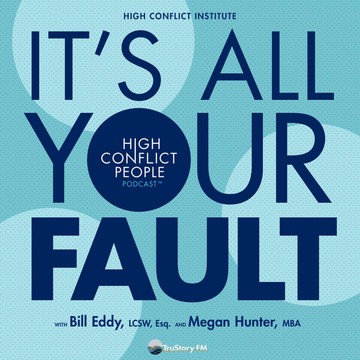
Dec 3, 2022 • 37min
Yes, And—Improvisation & Creativity in Conflict Communication with Guest Kelly Leonard of The Second City
The Second City – where countless actors and comedians got their start. They’ve been bringing the funny for over 60 years. Now the first name in improve and comedy, they’ve expanded well beyond the stage and into business, wellness, education and so much more. Kelly Leonard, Executive Director of Learning and Applied Improvisation at The Second City, joins Bill and Megan in this episode to talk about improvisation, creativity, and whether and how it can be used in conflict communication – especially in high conflict interactions. For over twenty years, he oversaw Second City’s live theatrical divisions working with such talent as Tina Fey, Stephen Colbert, Amy Poehler, Seth Meyers, Steve Carrell, and others.In this episode, we’ll talk about:Kelly’s book, Yes, Andimprovisation and creativity beyond the stageallowing anything to be on the tabledifferences between creativity and innovationallowing yourself to be a human beingthe effect of the body on the brain and anxiety (he’ll talk about what can be seen on an MRI when a smile is involved)so much moreLinks & Other Notes:KELLY’S BOOKYes, And: How Improvisation Reverses "No, But" Thinking and Improves Creativity and Collaboration--Lessons from The Second CityKELLY’S PODCAST"Getting to Yes, And"KELLY’S TEDxBroadwayTalkEmbrace Your FailuresKELLY’S COURSESThe Second CityOur website: https://www.highconflictinstitute.com/Submit a Question for Bill and MeganAll of our books can be found in our online store or anywhere books are sold, including as e-books.You can also find these show notes at our site as well.Note: We are not diagnosing anyone in our discussions, merely discussing patterns of behavior.
(00:00) - Welcome to It's All Your Fault
(01:17) - Meet Kelly Leonard
(08:08) - Yes! And...
(11:16) - Using It in Conflict Situations
(14:32) - Times to Not 'Yes And'
(17:18) - Thank You, Because...
(18:50) - Avoiding Escalation
(19:45) - Humor, Surprise, Delight
(20:27) - Why Improv?
(25:48) - The Science
(35:43) - Reminders & Coming Next Week: Jackhammer Parents
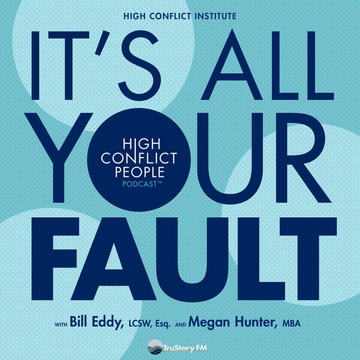
Nov 24, 2022 • 57min
Erasing Family with Guest Director Ginger Gentile
Erasing Family. In this age of cancellation, it’s not so rare. In the divorce and child custody (family court) world, cancellation has been a “thing” for a long time. Cancellation of the child’s other parent and even extended family is common. In this episode, Bill and Megan are joined by Ginger Gentile, director of the Erasing Family documentary. Erasing Family follows young adults fighting to reunite with their broken families. Part emotional roller coaster, part investigative exposé, the film “follows the money” to expose why loving moms and dads are erased from their kid’s lives by divorce. Bill and Megan will talk with Ginger about the documentary and discuss:why kids are often unaware they are alienated from a parentwhat should a parent say and do when their child says they never want to see them againwhat to do when a child refuses all contact with a parent, if anythingtop mistakes a parent makes when reuniting with a parenthow long it can take to reunite - whether it’s a process or can it be resolved in a daythe patterns that all families who reunite followbiggest changes in alienation in the last decadeself-care in alienationlistener questions focused on:getting through to the other parent just how damaging their behavior is on the kids; and protecting them from other parents behavior without also engaging in alienationhow to handle other family members who have been pulled into the conflictLinks & Other NotesGINGER GENTILE’S WEBSITE & DOCUMENTARYErasingFamily.OrgBOOKSDon’t Alienate the KidsBIFF for Communication: Your Guide to Difficult Texts, Emails and Social Media PostsPROGRAMS/COURSESNew Ways for Families for Parents & ChildrenOur website at High Conflict Institute: https://www.highconflictinstitute.com/Submit a Question for Bill and MeganAll of our books can be found in our online store or anywhere books are sold, including as e-books.You can also find these show notes at our site as well.Note: We are not diagnosing anyone in our discussions, merely discussing patterns of behavior.
(00:00) - Welcome to It's All Your Fault
(01:58) - Ginger Gentile
(03:37) - Questions
(06:27) - Erasing Family
(13:05) - Feedback
(16:17) - Alienated Children
(17:42) - Parental Responses
(19:21) - When Kids Refuse
(21:28) - New Ways for Families
(24:06) - Reunion Mistakes
(30:56) - Dealing With the Other Parent
(36:05) - Changes Over Time
(41:24) - Communicating If There's No Contact
(42:40) - Parental Self-Care
(43:49) - Counteracting Alienation
(45:58) - Counteracting Patterns
(49:00) - Being Ready
(52:03) - Target of Blame
(55:05) - Reminders
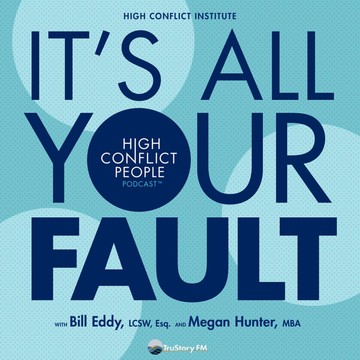
Nov 17, 2022 • 26min
Transforming Inmates into Peacemakers, with Guest Doug Noll: Part 2
Doug Noll, founder of Prison of Peace, discusses success stories, affect labeling, and recidivism rates in transforming inmates into peacemakers. The program's implementation, growth, and reasons for success are explored, offering hope for reducing conflict in communities.
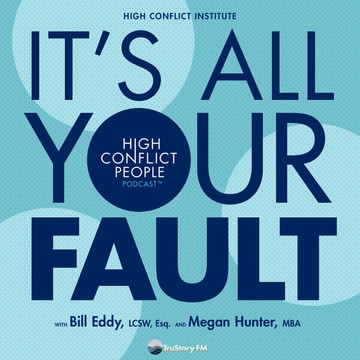
10 snips
Nov 10, 2022 • 32min
Transforming Inmates into Peacemakers, with Guest Doug Noll: Part 1
Doug Noll, a former trial lawyer turned peacemaking educator, discusses the transformative Prison of Peace program he co-created. He shares how the program trains incarcerated individuals in communication and conflict resolution, enabling them to become certified trainers. Listeners will learn about the science behind de-escalation techniques like affect labeling, the program's success in reducing recidivism, and the challenges faced in implementing such a novel approach within prison environments.
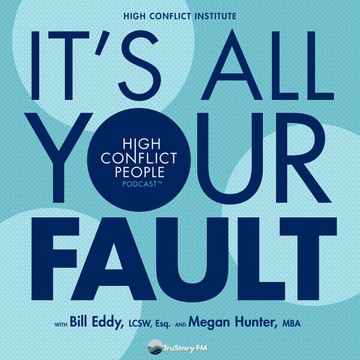
Nov 3, 2022 • 35min
Solutions for High Conflict at Work with Guest Cherolyn Knapp
In workplace conflict, handling complaints, upset employees and high conflict situations is taxing, leaving many organizations feeling stuck or without options other than termination or throwing hands up in the air and living with it. But there is a method to help employees learn necessary skills — a method called New Ways for Work: Personal Skills for Productive Relationships.In this episode, Bill and Megan are joined by Cherolyn Knapp, lawyer, mediator, workplace investigator and HCI’s newest speaker/trainer. Together they will discuss:high conflict situations in the workplacewhether conflict increased during covid and if so, whyobservations about how HR, coaches, management and others handle high conflict situations — and whether what they’re doing is workingNew Ways for Work as a skills-building tool for helping calm high conflict situations by teaching skills how New Ways for Work can help anyone who coaches challenging workplace conflict, including high conflict situationsCherolyn’s top 3 tips for HR, coaches, anyone working with high conflict situationsLinks & Other NotesCOURSENew Ways for Work® Training RegistrationBOOKSNew Ways for Work® Coaching Manualor on Amazon New Ways for Work® Workbookor on AmazonIt’s All Your Fault at Work: Managing Narcissists and Other High Conflict Peopleor on AmazonBIFF at Work: Your Guide to Difficult Workplace Communicationor on AmazonARTICLESNew Ways for Work: A New Coaching MethodWhy Can't They Get It? - What to do when coworkers and employees have no idea how they behave.GUEST BIOhttps://www.highconflictinstitute.com/aboutOur website: https://www.highconflictinstitute.com/Submit a Question for Bill and MeganAll of our books can be found in our online store or anywhere books are sold, including as e-books.You can also find these show notes at our site as well.Note: We are not diagnosing anyone in our discussions, merely discussing patterns of behavior.
(00:00) - Welcome to It's All Your Fault
(01:42) - Meet Cherolyn Knapp
(03:42) - Questions
(21:01) - New Ways for Work
(29:25) - Tips
(31:38) - Reminders & Coming Next Week:
(33:42) - Wrap Up
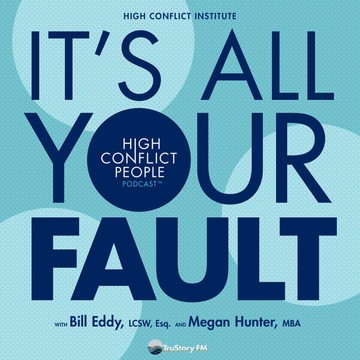
Oct 27, 2022 • 20min
What is the Difference Between Alienation & Estrangement?
Bill, an expert on alienation and estrangement, discusses the differences between the two in high conflict divorces. He emphasizes setting limits in intact families and offers insights on dealing with high conflict people. The episode explores the impact of parental decisions on child relationships and provides practical advice for managing relationships effectively.
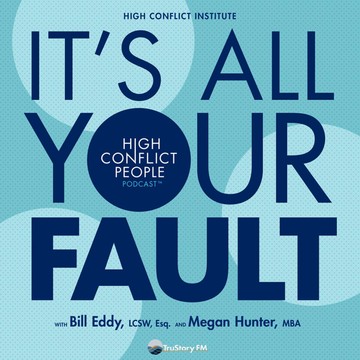
Oct 20, 2022 • 21min
What are the 4 Fuhgedaboudits When Interacting with Someone with a High Conflict Personality?
Learn strategies for interacting with high conflict personalities, including avoiding trying to give them insight into themselves. Understand the challenges of opening up emotions in relationships with high conflict personalities. Explore how our brains respond to high conflict situations and how to train our amygdala to stay calm. Remember the four key things when dealing with individuals with a high conflict personality.


